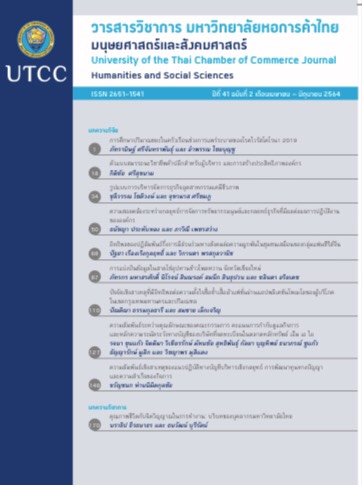Business Management Model for the Biochemical Industry
Main Article Content
Abstract
The objective of this research was to study the biochemical industry business management factors and create the biochemical industry business management model. This study was qualitative and quantitative mixed-method research. The instrument used in this study was the questionnaire and the populations were entrepreneurs, executives, and the biochemical industry staff. The qualitative analysis used content analysis, and the quantitative analysis used frequency, mean, percentage, standard derivation and factor analysis with statistical package. The study of the biochemical industry business management found that entrepreneurs’ potential in the biochemical industry factor included 6 factor loading as 1) work capacity 2) business management 3) law and ethics 4) value added 5) technology and innovation, and 6) power driven. The biochemical industry competition factor included 3 factor loading as 1) competitors and supplier 2) consumers’ behavior, and 3) government policy. The results of factor analysis were created the draft of the biochemical industry business management model for the experts to evaluate. The experts decided a unanimous vote that the biochemical industry business management model was appropriate to apply in the biochemical industry.
Article Details

This work is licensed under a Creative Commons Attribution-NonCommercial-NoDerivatives 4.0 International License.
ลิขสิทธิ์ของบทความ
ผลงานที่ได้รับการตีพิมพ์ถือเป็นลิขสิทธิ์ของมหาวิทยาลัยหอการค้าไทย ห้ามมิให้นำเนื้อหา ทัศนะ หรือข้อคิดเห็นใด ๆ ของผลงานไปทำซ้ำ ดัดแปลง หรือเผยแพร่ ไม่ว่าทั้งหมดหรือบางส่วนโดยไม่ได้รับอนุญาตเป็นลายลักษณ์อักษรจากมหาวิทยาลัยหอการค้าไทยก่อน
References
กัลยารัตน์ ธีระธนชัยกุล. (2557). จริยธรรมทางธุรกิจ. กรุงเทพฯ: ปัญญาชน.
จุฑามาส ศรีชมภู. (2563). รูปแบบการพัฒนาศักยภาพผู้ประกอบการในอุตสาหกรรมเคมีชีวภาพ (วิทยานิพนธ์ปริญญาดุษฎีบัณฑิต ไม่ได้ตีพิมพ์). มหาวิทยาลัยเทคโนโลยีพระจอมเกล้าพระ นครเหนือ, กรุงเทพฯ.
ชญาภัทร์ กี่อาริโย. (2557). รูปแบบการพัฒนาศักยภาพผู้ประกอบการวิสาหกิจชุมชนในกลุ่มจังหวัดภาคกลาง (วิทยานิพนธ์ปริญญาดุษฎีบัณฑิต ไม่ได้ตีพิมพ์). มหาวิทยาลัยเทคโนโลยีพระจอมเกล้าพระนครเหนือ, กรุงเทพฯ.
ชุลีวรรณ โชติวงษ์. (2563). รูปแบบการบริหารธุรกิจและกลยุทธ์ธุรกิจสิ่งพิมพ์ของมหาวิทยาลัยในกำกับของรัฐ. วารสารวิชาการนวัตกรรมสื่อสารสังคม, 8(1), 10-21.
ปฏิภาณ สุคนธมาน. (2561). แนวทางการพัฒนาอุตสาหกรรมเคมีเพื่อสิ่งแวดล้อมเพื่อขับเคลื่อนยุทธศาสตร์เศรษฐกิจชีวภาพ. รัฏฐาภิรักษ์, 60(2), 36-57.
วุฒิ สุขเจริญ. (2559). พฤติกรรมผู้บริโภค (พิมพ์ครั้งที่ 2). กรุงเทพฯ: จี.พี.ไซ เบอร์พรินท์.
พสุ โลหารชุน. (2559). กรมส่งเสริมอุตสาหกรรม เปิดสถิติ 8 ปัญหา SMEs ไทย. สืบค้นเมื่อ 4 สิงหาคม 2561, จาก https://www.smethailandclub. com /news-6745-id.html
กระทรวงพลังงาน, สำนักงานนโยบายและแผนพลังงาน (2558). แผนพัฒนาพลังงานทดแทนและพลังงานทางเลือก พ.ศ. 2558-2579. สืบค้นเมื่อ 4 สิงหาคม 2561, จาก https://ienergyguru.com/wpcontent/uploads/2015/09/AEDP2015_Final_version.pdf
สถาบันทรัพย์สินทางปัญญาแห่งจุฬาลงกรณ์มหาวิทยาลัย. (2560). รายงานการวิเคราะห์แนวโน้มเทคโนโลยีและอุตสาหกรรม อุตสาหกรรมเชื้อเพลิงชีวภาพและเคมีชีวภาพ. สืบค้นเมื่อ 4 สิงหาคม 2561, จาก http://www.ipthailand.go.th/images/3534/ web_01052018/Report_CHU/ 4_Biofuel_ and_ biochemical_04.12.2017_CHU.pdf
สำนักงานพัฒนาเศรษฐกิจจากฐานชีวภาพ (องค์การมหาชน). (2560). กรอบยุทธศาสตร์การพัฒนาเศรษฐกิจฐานชีวภาพ. ระยะ 20 ปี พ.ศ. 2560-2579. กรุงเทพฯ: ผู้แต่ง.
สุชาติ ไตรภพสกุล. (2558). ผู้ประกอบการไทยในยุคประชาคมเศรษฐกิจอาเซียน. สืบค้นเมื่อ 25 มีนาคม 2561, จาก http://www.forbesthailand.com/commentaries- detail.php?did=697
สุเทพ เพชรมาก. (2562). วิธีการเลือกคนของแจ๊ค เวลช์. สืบค้นเมื่อ 25 มีนาคม 2562, จาก www.baanjomyut.com/library_2/ extension3/ how_to_ select_a_jack_welch/index.html
อรรวีวรร โกมลรัตนวัฒนะ. (2557). รูปแบบการพัฒนาศักยภาพของผู้บริหารระดับสูงในการบริหารงานเพื่อเพิ่มความสามารถการแข่งขันในอุตสาหกรรมเครื่องดื่มที่มีแอลกอฮอล์ (วิทยานิพนธ์ ปริญญาดุษฎีบัณฑิต ไม่ได้ตีพิมพ์). มหาวิทยาลัยเทคโนโลยีพระจอมเกล้าพระนครเหนือ, กรุงเทพฯ..
อินทิรา จันทร์สอน. (2560). รูปแบบการบริหารธุรกิจสวนน้ำ (วิทยานิพนธ์ ปริญญาดุษฎีบัณฑิต ไม่ได้ตีพิมพ์). มหาวิทยาลัยเทคโนโลยีพระจอมเกล้าพระนครเหนือ, กรุงเทพฯ.
Aguilar, F. J. (1967). Scanning the business environment. New York: Macmillan.
Bacigalupo, M., Kampylis, P., Punie, Y., & Van den Brande, G. (2016). EntreComp: The entrepreneurship competence framework. Luxembourg: European Union.
Fayol, H. (1949). General and industrial management. London: Sir Isaac Pitman & Sons.
Frederick, H. H., Kuratko, D. F., & Hodgetts, R. M. (2007). Entrepreneurship: theory, process and practice. South Melbourne, Australia: Thomson Learning.
Foxall, G. R., & Sigurdsson, V. (2013). Consumer behavior analysis: Behavior economics meets the marketplace. The Psychological Record, 63(2), 231-238. https://doi.org/10.11133/j.tpr.2013.63.2.001
Hisrich, R. D., Peters, M. P., & Shepherd, D. A. (2008). Enterpreneurship. London: McGraw Hill.
Robbins, S. P. (1990). Organization theory: Structure design and application (3 rd ed.). Upper Saddle River, NJ.: Prentice-Hall.
Peter, D. (1995). The practice of management. New York: Haper & Row.
Porter, M. E. (1998). Competitive strategy: Techniques for analyzing industries and competitor. New York: Free Press.


